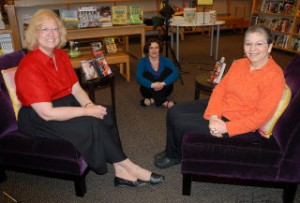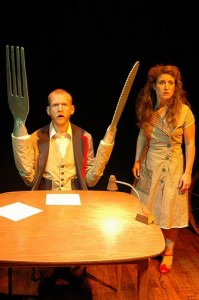Shop of work, or something like that
So, I’m teaching a grad-level fiction workshop for the first time next fall. I’m excited and nervous. It feels like a big deal. In my pedagogical statements, I write about how many fiction students don’t know how to read. That is, they read like they’re lit majors: they read for analysis and to say something clever about the text. (I was no exception before and during my MFA.)
BUT, but, writers read in a fundamentally different way. We read with our own writing in mind: what works, what doesn’t, what should we take from this writer, what does this writer do that we also do that fails, etc.
My undergrad fiction workshops are always very reading heavy. We read something like 8-10 books. Every book comes with some kind of “craft” lesson. I attempt to teach students how to read as a writer. Mostly, it works.
In Defense of the Democratic, Therapeutic Workshop

This is in response to Kyle’s comment on Sean’s post. Or, maybe in reaction. In the comment thread, I responded to part of what Kyle said, but the rest of my response veers pretty far from what Sean was asking, so I’m going to develop it here instead.
I want to take up the ideas of workshop as democracy and workshop as therapy session. What does it mean, really, to say you don’t like those ideas? I should just let Kyle answer that first, but I’m going to say what I make of those terms first.
Workshop as democracy: If I was the one saying that, I would mean that a workshop is a chance to hear from a group of the kind of people who would be your readers. With nobody’s reading being privileged, including the professor’s, who is just one reader. The professor certainly is there to teach how to respond to peer work, how to read and respond sensitively, but hers shouldn’t be the final word. Bruce Covey was telling me last night that he never speaks during the workshops he teaches. Each workshop, a student facilitates. I think this is a wonderful idea. Sure, workshops can work beautifully in other ways, too, but I think this is one good way. This can come down to tiny details. It’s great to know whether 10% or 80% of readers don’t catch a certain reference. To be in control of that, of how obscure the references are. I prefer the perhaps squishy sounding term “focus group” to “democracy” for this function (not the only function, but one function) of a workshop.
Workshop as therapy session: This is thrown around a lot, always negatively. Workshop shouldn’t be therapy. I think there are two problems with this. One, what kind of therapy are we talking about. Substitute “person” in what Kyle says at the end. “…from there, to help a [person] do the thing the [person] really wants to do as powerfully and truly as the [person] can.” That can be (should be?) the goal of therapy, no? When I went to therapy, that’s what I was looking for, and I found it. This happened in many ways and on multiple levels, but I’ll use an example that has to do with writing. Toward the end of my course of therapy, my main problem was that I was behind on my thesis. (After I finished, my therapist said it was time I set new goals or quit therapy. I quit, and we kept in touch.) My therapist said, how about writing five pages a day (I think she said three at first, but I explained I wouldn’t make the deadline that way). I started writing five pages a day. I finished the thesis. I sent the critical component of the thesis–which was never workshopped–to someone I interviewed for it. He wanted me to adapt it for the magazine he edits. Made $1500 for the article. Didn’t pay for my whole course of therapy, but it more than covered the session where she said to just write 5 pages a day. Why shouldn’t a workshop do this?
Workshop of Horrors
Crazy is OK. Who hasn’t awoken on the kitchen floor, naked? And hanging out with/knowing/dating Crazy can be fun, or funny. Loud-Talker, Close-Talker, Person-Who-Eats-Only-Boiled Potatoes, every mélange and mishmash of personality—it’s cool.
But English departments have small rooms. And they seem to stuff workshops in the tiniest, the concrete walls, flickering fluorescent hum, chalkboard with that awful stuff, chalk. Like a bonfire, Crazy is Ok with a bit of open space, but in a small, closed room, the romance of the cracking heat tends to burn.
Did I mention the semester begins today?
What is your workshop horror story? I’ll flavor the pot with my top 3.
1.) Student of mine who brought a coffee mug of vodka and OJ to class every meeting (no big problem [maybe–he did get a bit sloppy/vociferous at times, and I had to tell him more than once that the phrase “words-of-ass” is never appropriate or helpful feedback] except for when the woman next to him narked).
2.) Student of mine who wrote intricate, detailed, very specific story about killing every member of the class in intricate, detailed, very specific ways. In a recent post-911 environ of paranoia, this incident ended up involving the ABI (Alabama state FBI) and two undercover cops who pretended they were college students.
3.) Fellow student (this in grad school) who leaped up and screamed into all our faces (causing crying and/or additional screaming) because the instructor insulted Richard Nixon. Was I frightened? Indeed.
You?
Fiction Workshops Examined
I don’t know what the secret of success is for writers, but I doubt it has anything to do with writing workshops. To be blunt (and it is Mean Week), it seems like you’re just paying strangers to take mild interest in your work. This might even be the case with an MFA in writing—who knows; I work full-time at an office and publish mere ‘flash’ online, so that tells you how much I know.
I google imaged “fiction workshop” and have written about some photos I’ve found.

I. NOT ENOUGH CHAIRS
Maybe they’re gearing us up for a life of the ‘starving artist,’ or maybe it’s some Hindu thing. All I know is, any more pressure on that women’s coccyx and she’s gonna accidentally CTRL-A and hit backspace. There goes two weeks of writing lady. Life is unfair, you should hit the save button more often.

II. IN A HURRY TO LEAVE
The guy’s already zipped up this bag. Shawl women in the middle is looking at for the nearest fire escape. Ms. Happy on the right can’t believe it’s already :57. They are thinking “I’m down 300 dollars and my ego is still a wet fish flopping over the barren plateau of my non-existent career.” Either that, or we got some major bladder issues.

III. UNHAPPY BLACK PEOPLE
If art is indeed a microcosm of society, then, as usual, the black people are pissed—and for good reason. I imagine they just got through reading five stories about boyfriends and living in apartments and trouble with granny or a weekend in Cape Cod that turned out colder than one thought. Tiesha (let’s call her that) works two jobs at KFC and Carl’s Jr., and she’s not in the fucking mood to hear white bitches moan about a blowjob gone bad.

IV. JUDGMENTAL BODY LANGUAGE
If you are a writer, deep down inside you think this: “My stories are better than this asswhipe over here. What kind of self-involved baby writes in the first-person anyways?” Graciousness is a myth; we are all resentful at attention directed at someone else; like every time Blake gets into another journal (which is every other day), I say ‘fuck him, I hope he cuts his cornea with the table of contents.’

V. WOMAN LIKE TO BE OUTSIDE
I’m not one for creating gender stereotypes, but seriously, women think fiction is better outside for some reason. It must have been E.M. Forster’s A Passage to India that started this fascination with abandoning one’s domestic prison and going outside into the sand swept wind. Of course, take away their sunglasses, suntan lotion, sunhats, and folding chairs and they’d be fucked. They’d come back into the foyer looking like Bukowski’s nose, or worse, Joan Didion’s face. (Be nice now, it’s mean week.)

